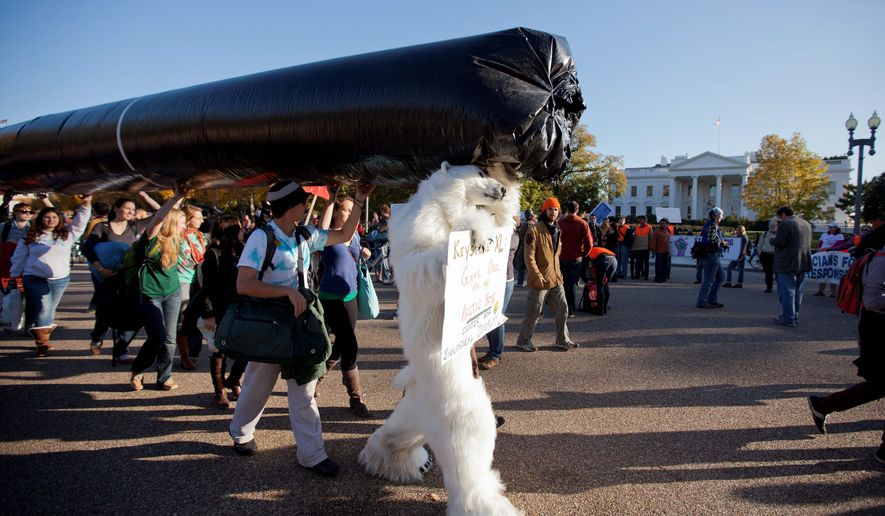Citing environmental fears, the State Department on Thursday ordered a new review of a Canada-to-Texas oil pipeline, effectively delaying a final decision until after the 2012 elections and prompting a wave of criticism from businesses, unions and congressional Republicans, who called the move a “job killer.”
The State Department instructed that TransCanada’s planned Keystone XL pipeline be moved yet again, saying the current route could destroy Nebraska’s sandhills and the Ogallala Aquifer, which supplies water for much of the Midwest. The needed environmental reviews and approval processes for any new route for the pipeline will put off final approval for the project until at least early 2013.
“I support the State Department’s announcement today regarding the need to seek additional information about the Keystone XL Pipeline proposal,” President Obama said in a statement.
“Because this permit decision could affect the health and safety of the American people as well as the environment … we should take the time to ensure that all questions are properly addressed and all the potential impacts are properly understood. The final decision should be guided by an open, transparent process that is informed by the best available science and the voices of the American people.”
The result of the delay, which puts off a decision on a matter that pits Mr. Obama’s environmentalist backers, who call the pipeline dangerous, against his union supporters, who say the nation needs these jobs immediately, prompted suspicion from Republicans on Capitol Hill.
“I will note the timing looks suspiciously political,” said Sen. Mike Johanns, Nebraska Republican. “Why would this review require 18 months? The State Department spent many months examining multiple routes through Nebraska, one of which is adjacent to the Keystone pipeline operating today.”
The State Department denied that the Obama administration had any influence on the decision to delay.
“This is not a political decision,” said Kerri-Ann Jones, assistant secretary in the Bureau of Oceans and International Environmental and Scientific Affairs at the State Department. “Regarding the White House, the White House did not have anything to do with this decision.
“They did not direct us to make this decision. … There was no effort to sort of influence our decision.”
The decision was announced just days after the State Department’s office of inspector general decided to investigate whether the department’s environmental and national-interest reviews were tainted by conflicts of interest or bias. Some observers speculated that the probe could have spooked the State Department into ordering a new route and accompanying studies.
The $7 billion pipeline, which already has been delayed for about three years, would stretch nearly 1,700 miles through Montana, North Dakota, South Dakota, Nebraska, Kansas, Oklahoma and Texas, with a branch heading east into Missouri and Illinois.
It would transport as many as 1.1 million barrels a day of Alberta’s tar-sands oil to U.S. refineries and would create an estimated 13,000 construction jobs and 7,000 manufacturing jobs.
As a result, an unusual coalition of congressional Republicans and unions piled on the decision Thursday, warning that the move will cost the nation thousands of much-needed jobs - an issue that is sure to come up during the presidential campaign.
“More than 20,000 new American jobs have just been sacrificed in the name of political expediency,” House Speaker John A. Boehner, Ohio Republican, said in a statement. “By punting on this project, the President has made clear that campaign politics are driving U.S. policy decisions - at the expense of American jobs.
“The current project has already been deemed environmentally sound, and calling for a new route is nothing but a thinly-veiled attempt to avoid upsetting the president’s political base before the election. It’s a failure of leadership.”
Rep. Tom Price, Georgia Republican, also said the president is taking the easy way out.
“When given a wonderful opportunity to create jobs, the president says, ’No,’ ” he said in a statement. “What a disappointing display of a lack of leadership, particularly when so many Americans are out of work.”
Terry O’Sullivan, general president of the Laborers’ International Union of North America, said he was disappointed that a decision was made “on the basis of a political calculation.”
“The Obama administration chose to inflict a potentially fatal delay to a project that is not just a pipeline but is a lifeline for thousands of desperate working men and women,” he said. “The administration chose to support environmentalists over jobs - job killers win, American workers lose.”
The union backed Mr. Obama in the 2008 election.
Environmentalists see the delay as new hope that they can defeat altogether TransCanada’s plan to build the pipeline.
“President Obama is making the right and tough decision for our land and water,” Jane Kleeb of Bold Nebraska said in a statement.
They have support from a number of congressional Democrats.
“For more than a year, I have been working to convince the State Department that their environmental review for the proposed Keystone XL pipeline is flawed, insufficient, and dangerous to the well-being of the American people,” Rep. Steve Cohen, Tennessee Democrat, said in a statement. “I am pleased to see that the State Department has finally recognized the inadequacy of their work and is taking the necessary time to complete a thorough, accurate review.”
The reaction was negative north of the border. Canadian Prime Minister Stephen Harper told reporters that he was disappointed by the delay.
“The pipeline will create thousands of jobs and billions in economic growth on both sides of the border,” he said.
TransCanada’s president and CEO, Russ Girling, took a shot at the decision to kill what he called “shovel-ready” jobs.
“If Keystone XL dies, Americans will still wake up the next morning and continue to import 10 million barrels of oil from repressive nations, without the benefit of thousands of jobs and long-term energy security,” he said.
• Tim Devaney can be reached at tdevaney@washingtontimes.com.




Please read our comment policy before commenting.